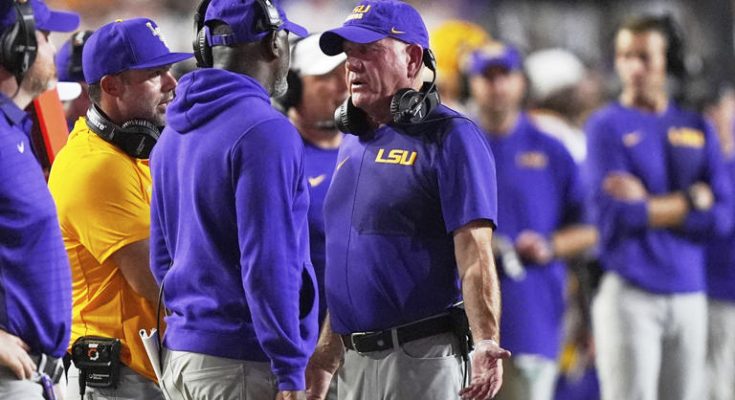LSU football faces a critical early-season test as it prepares to host Florida in Week 3, and the Tigers may be navigating this matchup without one of their key offensive linemen. Center Braelin Moore has been listed as questionable for the game, raising questions about LSU’s interior line stability and its overall offensive rhythm. Moore, a highly regarded lineman for the Tigers, has been instrumental in both pass protection and run blocking schemes, making his potential absence a significant concern for head coach Brian Kelly and his staff. His leadership and experience on the offensive line have not only provided physical strength but also a mental anchor for a unit that relies heavily on cohesion and communication. The center is often the linchpin for both snapping consistency and line calls, adjusting protections based on defensive alignments, and any disruption to that continuity can ripple through the offensive game plan. Moore’s status as questionable leaves LSU fans, analysts, and opposing teams pondering how the Tigers will adjust their offensive approach if he cannot play.
Braelin Moore’s importance to LSU’s offensive strategy cannot be overstated. As the starting center, he serves as the primary communicator along the offensive line, identifying blitzes, stunts, and defensive shifts while ensuring that all linemen are aligned correctly before the snap. In a game against a team like Florida, which has historically fielded aggressive and dynamic defensive fronts, the center’s role becomes even more critical. LSU will need someone capable of reading the Gators’ defensive schemes and adjusting protections in real time. Moore’s ability to anticipate the defensive line’s moves, coupled with his technique in both pass and run blocking, has often been a deciding factor in the Tigers’ ability to execute complex offensive schemes effectively. His questionable status brings uncertainty, as backup centers will need to step up to fill both his physical and mental roles, which could impact LSU’s timing, rhythm, and overall effectiveness on offense.
In addition to his technical skills, Moore brings leadership qualities that are often difficult to quantify. His presence in the locker room and on the practice field has helped mold LSU’s younger offensive linemen, instilling confidence and ensuring that communication remains seamless under pressure. The center often serves as a mentor to the guards and tackles, helping them understand defensive tendencies and adjustments that can make the difference between a successful play and a breakdown. If Moore is unable to participate against Florida, LSU will not only lose a skilled technician on the field but also a leader who helps maintain cohesion during high-pressure moments. This dynamic is crucial, especially against a team known for its ability to apply relentless defensive pressure.
The potential absence of Moore could also influence LSU’s offensive game plan. Coach Brian Kelly and his offensive staff may need to make adjustments to compensate for any drop-off in experience or skill at the center position. This could include simplified protection schemes, quicker passing concepts, or increased use of misdirection and motion to keep the Gators’ defense off balance. Additionally, LSU may emphasize running plays away from the center or utilize formations that provide extra support through tight ends or running backs. Each adjustment, however, comes with trade-offs, potentially limiting the full range of the Tigers’ offensive arsenal and making them somewhat predictable against a team as disciplined as Florida.
From Florida’s perspective, Moore’s questionable status could influence their defensive preparation. Opposing coaches often look for vulnerabilities on the offensive line to exploit, and an inexperienced or backup center could be seen as a potential weak point. Defensive coordinators could dial up stunts, twists, or blitz packages aimed at generating interior pressure, disrupting the quarterback’s timing, and forcing hurried decisions. LSU’s offensive line must rise to the challenge, and any lack of cohesion could result in negative plays or turnovers, impacting the Tigers’ chances in what is expected to be a tightly contested matchup.
Despite the uncertainty surrounding Moore’s availability, LSU’s depth along the offensive line could mitigate some concerns. The Tigers have recruited and developed talent capable of stepping in when injuries occur, though the learning curve and chemistry required to execute at a high level are significant. Backup centers will need to showcase not only physical readiness but also mental sharpness to handle line calls and adjustments on the fly. In practice leading up to Week 3, the coaching staff will likely place extra emphasis on preparing all offensive linemen for the possibility that Moore may not start. Drills simulating Florida’s defensive looks, coupled with communication exercises and mental reps, will be crucial in ensuring the line is as prepared as possible.
In addition to on-field concerns, the emotional aspect of Moore’s questionable status cannot be ignored. Teammates often draw confidence and stability from experienced players, and uncertainty about a key starter can affect morale. Leadership from other senior players, both on the offensive line and throughout the team, will be important in maintaining focus and confidence. LSU’s team culture, built over years under Coach Kelly, emphasizes resilience and adaptability, qualities that will be tested if Moore is unable to take the field.
LSU fans, who are closely following the injury report, understand the stakes of this matchup. Florida remains one of the Tigers’ most formidable conference rivals, and games between these teams often have significant implications for SEC standings and postseason aspirations. The uncertainty surrounding Moore adds an extra layer of intrigue and concern. Analysts and commentators are already speculating on potential lineup adjustments, game plan modifications, and the impact of Moore’s absence on the Tigers’ overall performance. In a conference as competitive as the SEC, the margin for error is slim, and every detail, including the health of a starting center, can influence the outcome.
Moore’s questionable status also highlights the broader challenges of managing player health in college football. With a rigorous schedule, high-intensity practices, and the physical demands of SEC play, injuries and illnesses are inevitable. Coaching staffs must constantly balance the desire to field their best players with the need to protect their long-term health and development. Deciding whether Moore will play against Florida involves evaluating his current condition, potential risks, and the overall needs of the team. Medical staff, trainers, and coaches must collaborate closely to make the best decision for both the player and the team, weighing short-term gains against long-term health considerations.
The Week 3 matchup against Florida also provides an opportunity for LSU’s backup players to step into the spotlight. If Moore cannot play, the center position will become a platform for a younger player to showcase his skills and gain valuable experience against one of the SEC’s top defenses. These moments are critical for player development and can reveal the depth and resilience of the team. Success in this scenario requires not only talent but also preparation, poise, and the ability to perform under pressure. LSU’s coaching staff has a track record of developing depth, and the performance of the backup center could be a defining factor in the game.



